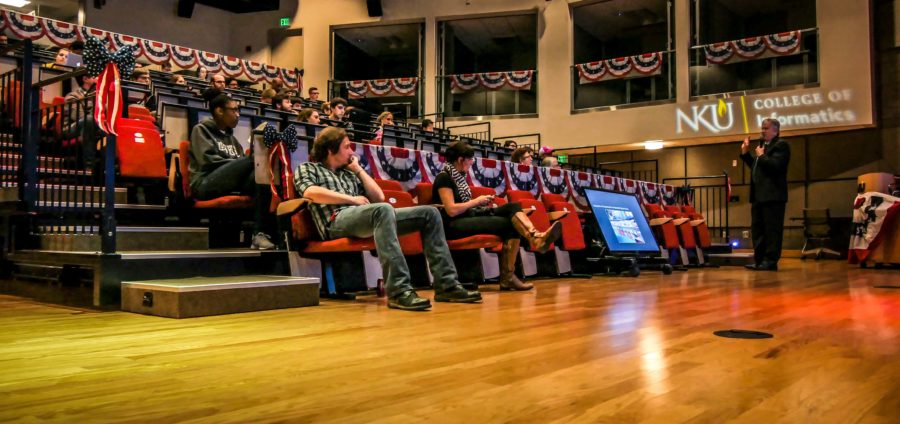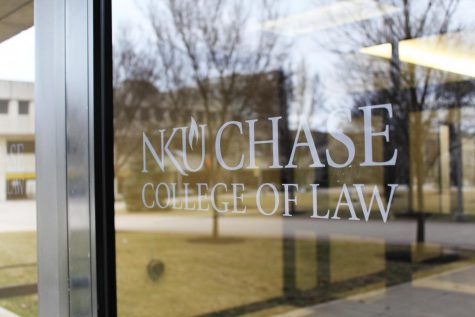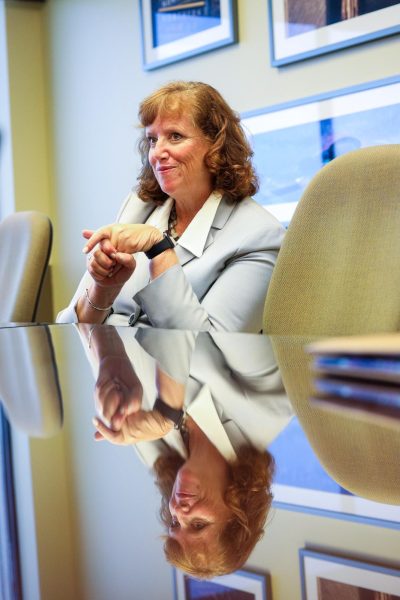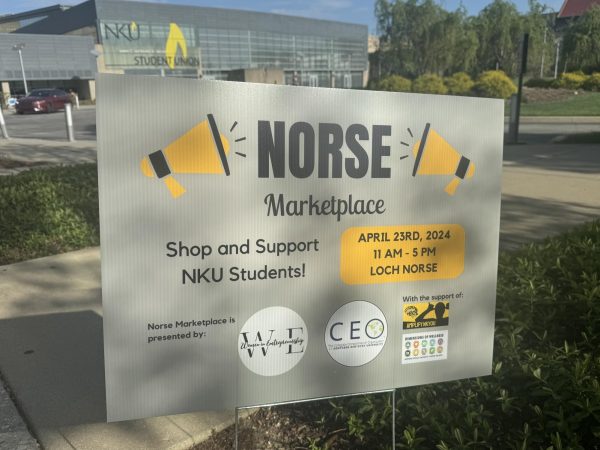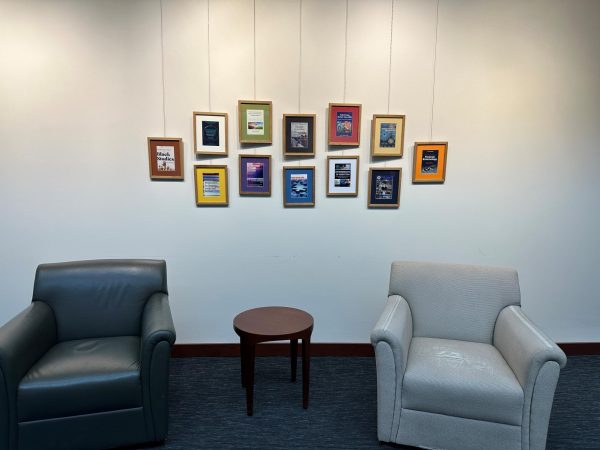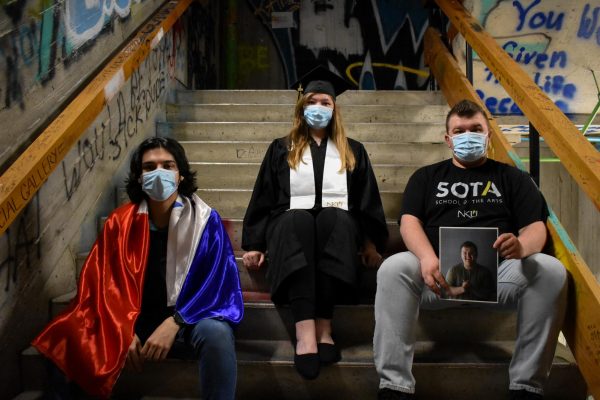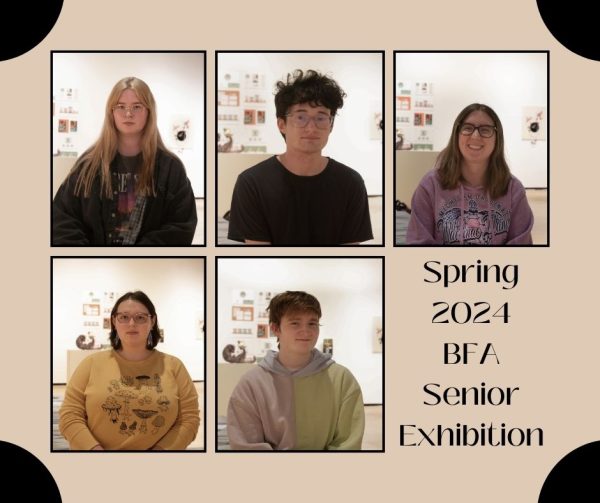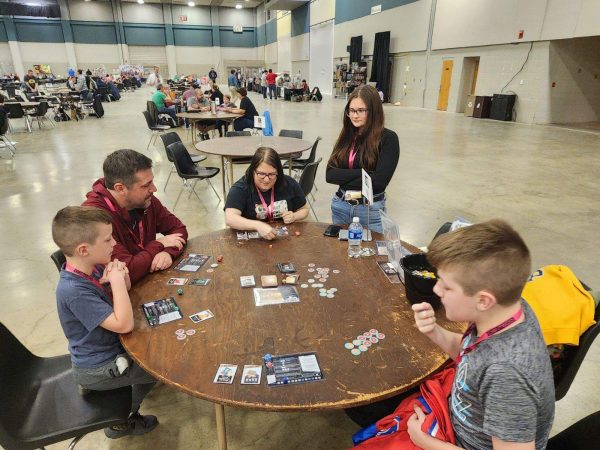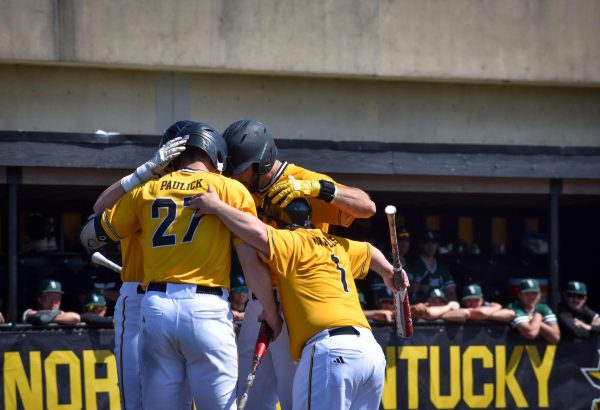Student on debate: Trump ‘may do some reckless things’
NKU community tunes in for final Debate-In on campus
Students, faculty and staff tuned in to the final presidential debate Wednesday night in the digitorium.
The final presidential debate was broadcasted to screens across America Wednesday night, including the oversized, paneled screen of NKU’s Rieveschl Digitorium.
The third presidential “Debate-In” event was held in Griffin Hall’s Digitorium Wednesday night, featuring pizza, polls, and plenty of excited students who braved the weather to watch the last presidential debate.
Hosted by communications studies professor Dr. Steven Weiss, the Debate-In centered around the final time Democratic nominee Hillary Clinton would debate with Republican nominee Donald Trump.
Two other Debate-Ins were held for the first debate and the vice presidential debate.
Krista Rayford, Communications and Event Manager for the College of Informatics, said the event gives students an opportunity to voice their political beliefs in a safe atmosphere.
“We decided to do this event primarily because we knew how big it would be in the media and how much talk there would be among students,” Rayford said. “Both candidates have made promises for students and our future.”
Rayford said she believes it is important to host these kinds of events at NKU because it is the real world.
“We speak to experiential learning a ton, as in the spaces we have here that the students can learn in,” she said, “and there’s nothing more real world than politics.”
Weiss began the evening by screening 2008 documentary “Debating Our Destiny.” The film, hosted by PBS anchor and debate moderator Jim Lehrer, highlighted moments from each presidential debate from 1976 to 2004.
Sophomore social work and theatre double major Kevin Birdwhistell said the moments seen in the film looked “tame” compared to 2016 debate moments.
Minutes before the debate, students discussed their predictions.
Junior public relations major Atley Smedley said he was disappointed in Trump’s performance at the first debate on Sept. 28. Smedley, a student of Weiss’s presidential debates class, predicted Trump “may do some reckless things.”
“We aren’t going to learn anything new tonight,” Smedley said, “and they’re just going to bash the hell out of each other.”
Freshman Michael Popper said he anticipated the candidates would discuss more domestic affairs. Popper, a nursing student, expressed disappointment in the choice of candidates, and said that he considers both Clinton and Trump below average.
Freshman electronic media & broadcasting major Ben Bardgett said he was excited about watching with other students, text-in polling and the interactivity at the event.
“You can actually see responses to the debate as it happens,” Bardgett said. “I like coming here because you get to hang out with and engage in a room with other people, so it’s different from watching the debate alone on your television.”
Fox News anchor Chris Wallace moderated the debate held at the University of Nevada, Las Vegas. He opened with a question about the vacancy on the Supreme Court left after the death of Justice Antonin Scalia, and both candidates elaborated on how they would fill that vacancy.
After a heated argument on abortion and 1973 Supreme Court ruling Roe v. Wade, Clinton went after Trump’s plans to build a border wall and his position against amnesty for illegal immigrants.
Clinton said she does not want to “rip families apart,” while Trump countered that he believes
“amnesty is a disaster.”
Wallace brought up accusations of sexual assault on both Trump and Clinton’s husband, former president Bill Clinton. Trump said the recent allegations of sexual assault against him were “fiction” and “lies.”
“Donald thinks belittling women makes him bigger,” said Clinton of Trump’s behavior toward his
accusers.
“Nobody has more respect for women than I do,” Trump said in response, which caused an eruption of laughter. Laughs also came after Trump told Clinton, “Excuse me, it’s my turn.”
Crowd interaction grew on Twitter in the middle of the debate. The feed for @nku_informatics refreshed on the right side of the screen above text-in poll results. Laughter and light applause would break out as memes and jokes appeared on the screen. Commentary about the candidates was also abundant, as were student interactions online.
Next, Wallace asked if Trump would accept the results of the election whether he won or lost, after Trump recently claimed that the election might be rigged against him. Trump would not specify whether he would accept election results.
“What I’m saying is I’ll tell you at the time,” he said. “I’ll keep you in suspense.”
Clinton attacked that comment and said Trump’s answer was “not the way democracy works.”
Trump called Clinton “such a nasty woman” after she said Trump might find a way to get out of paying rising taxes on the wealthy.
Among other issues debated were the economy, cyber attacks, debt, trade, the use of nuclear weapons and handling the Middle East.
The debate closed with one-minute statements from each candidate. Clinton promised more jobs, education and that she will “stand up for families against powerful interests and corporations.”
While Trump cited a “depleted military,” immigration problems and inner cities that “are a disaster.” He concluded with a repeat of his campaign slogan to “make America great again.”
Weiss said that both candidates did what they needed in order to be successful at the debate and that “it sounded more like a conventional debate.”
When Weiss opened the discussion to student reactions, some discussed who they believe won the debate, while others brought up issues they heard or did not hear.
Freshman anthropology major Grant Cottingham said he had hoped to hear the candidates speak more on poverty, social and environmental issues, but was glad the candidates discussed healthcare.
Cottingham, who plans to vote third party, said “I don’t feel they have scratched the surface of what they need to be talking about. It felt like more of the same.”


